Bamboo, often referred to as "the green gold of the plant kingdom," is rapidly emerging as a cornerstone of sustainable living. Its remarkable properties and eco-friendly benefits have positioned it as a frontrunner in the realm of environmentally-conscious products. Let's embark on a journey to uncover the wealth of advantages that bamboo offers and its transformative impact across various industries.
The Eco-Friendly Essence of Bamboo
1. Unprecedented growth rate:
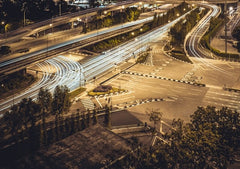
Unlike traditional hardwood trees, which can take decades to mature, bamboo shoots skyward at an astonishing pace. With some species of bamboo growing up to 91 centimeters (36 inches) in just 24 hours! Bamboo is one of the fastest-growing plants on Earth, reaching maturity within three to five years. This rapid growth rate ensures a readily available and a very sustainable source of raw material.
2. Environmental prowess:

Bamboo's cultivation requires minimal intervention compared to conventional crops. It thrives in diverse climates and soil types, flourishing without the need for chemical fertilisers or pesticides. Additionally, bamboo's extensive root system acts as a natural erosion deterrent, stabilizing soil and preventing runoff, thereby promoting soil health and biodiversity.
3. Carbon sequestration champion:

Bamboo stands as a formidable ally in the battle against climate change. Its exceptional capacity for carbon sequestration enables it to absorb up to four times more carbon dioxide and release 35% more oxygen than equivalent stands of trees. By harnessing bamboo's carbon-capturing prowess, we can mitigate greenhouse gas emissions and combat the adverse effects of global warming.
4. Endless versatility:
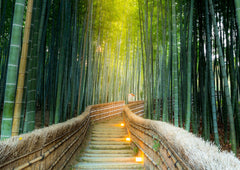
The versatility of bamboo knows no bounds. From its robust fibres to its pliable shoots, every part of the plant serves a purpose. Bamboo fibres are spun into luxuriously soft textiles for clothing and bedding, while its durable culms are fashioned into an array of household items, ranging from toothbrushes and kitchenware to flooring and furniture. Moreover, bamboo has natural antimicrobial properties, this is called "bamboo kun", to make it an ideal candidate for hygienic and eco-friendly products.
Bamboo in Action: Sustainable Solutions for Everyday Living
1. Bamboo clothing and apparel:
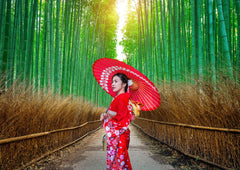
Bamboo fabric, renowned for its breathability, moisture-wicking capabilities, and silky-smooth texture, has revolutionized the apparel industry. The eco-friendly attributes of bamboo clothing extend beyond comfort, offering hypoallergenic and UV-resistant properties that cater to discerning consumers seeking sustainable alternatives. Even socks can be made from bamboo and Voyage Fair Trade has its own collection of socks.
2. Biodegradable Toothbrushes:

Traditional plastic toothbrushes contribute to the staggering volume of plastic waste that inundates our landfills and oceans. Bamboo toothbrushes, with their compostable handles and plant-based bristles, present a viable solution to this environmental dilemma. By embracing bamboo oral care products, individuals can make a tangible impact on plastic pollution while maintaining optimal dental hygiene.
3. Eco-Conscious tableware:
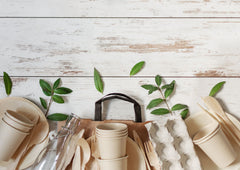
Bamboo's resilience and aesthetic appeal make it an ideal choice for crafting eco-conscious tableware, including plates, bowls, and utensils. These biodegradable alternatives to disposable plastic tableware offer a sustainable option for everyday dining, reducing reliance on single-use plastics and minimising environmental harm.
4. Sustainable shelter solutions:
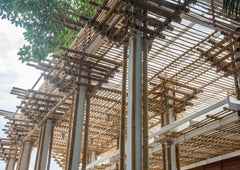
Bamboo's strength-to-weight ratio and natural beauty render it a sought-after material for sustainable construction, it has been used for up to 7000 years! Bamboo flooring, renowned for its durability and renewability, adds a touch of elegance to interior spaces while reducing dependence on finite resources. Additionally, bamboo-based composite materials, such as bamboo plywood and engineered bamboo, offer eco-friendly alternatives for structural components and furniture.
5. Renewable resource in beverage production:

Bamboo's utility extends into the realm of beverage production, where its fibrous stalks serve as vessels for fermentation. Bamboo's porous structure and unique properties impart distinct flavours and characteristics to alcoholic beverages, offering a sustainable alternative to conventional oak barrels. This innovative approach not only enhances the sensory experience for consumers but also underscores the versatility of bamboo in modern industry.
Embracing Bamboo: A Sustainable Shift

As we navigate the complexities of a rapidly changing world, bamboo emerges as central beacon of sustainability and resilience. Its innate properties and eco-friendly attributes empower individuals and industries to make conscientious choices that safeguard our planet's future. By embracing bamboo-based products, we embark on a journey towards a more sustainable existence—one that harmonises with nature's rhythms and fosters harmony between humanity and the environment. Let us join together in our commitment to harness the eco-friendly potential of bamboo, forging a path towards a greener, more sustainable future.






















